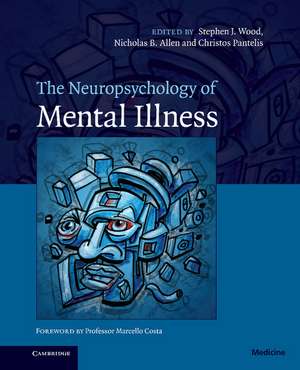The Neuropsychology of Mental Illness
Editat de Stephen J. Wood, Nicholas B. Allen, Christos Pantelisen Limba Engleză Hardback – 30 sep 2009
Preț: 975.17 lei
Preț vechi: 1026.49 lei
-5% Nou
Puncte Express: 1463
Preț estimativ în valută:
186.61€ • 192.80$ • 155.23£
186.61€ • 192.80$ • 155.23£
Carte tipărită la comandă
Livrare economică 19 martie-02 aprilie
Preluare comenzi: 021 569.72.76
Specificații
ISBN-13: 9780521862899
ISBN-10: 0521862892
Pagini: 464
Ilustrații: 25 b/w illus. 11 colour illus. 8 tables
Dimensiuni: 196 x 252 x 25 mm
Greutate: 1.16 kg
Editura: Cambridge University Press
Colecția Cambridge University Press
Locul publicării:Cambridge, United Kingdom
ISBN-10: 0521862892
Pagini: 464
Ilustrații: 25 b/w illus. 11 colour illus. 8 tables
Dimensiuni: 196 x 252 x 25 mm
Greutate: 1.16 kg
Editura: Cambridge University Press
Colecția Cambridge University Press
Locul publicării:Cambridge, United Kingdom
Cuprins
Dedication; Foreword; Preface; List of contributors; Part I. Neuropsychological Processes: 1. Developmental neuropsychology: normative trajectories and risk for psychiatric illness; 2. Processes and mechanisms in neuropsychiatry: sensory-perceptual; 3. Processes and mechanisms in neuropsychiatry: motor-executive processes; 4. The neurobiology of the emotion response: perception, experience, and regulation; 5. Frontal asymmetry in emotion, personality and psychopathology: methodological issues in electrocortical and hemodynamic neuroimaging; 6. Approaches to understanding language dysfunction in neuropsychiatric disorders: insights from the study of schizophrenia; 7. Associative memory; 8. The neural basis of attention; 9. The role of executive functions in psychiatric disorders; 10. Decision-making; 11. The neuropsychology of social cognition: implications for psychiatric disorders; Part II. The Importance of Methods: 12. Psychiatric diagnoses: purposes, limitations and an alternative approach; 13. Neuropsychological methods in mental disorders research: illustrations from methamphetamine dependence; 14. The study of emotion and the interaction between emotion and cognition: methodological perspectives; 15. Neurophysiology: using neurophysiological techniques to study auditory hallucinations in schizophrenia; 16. Neuroimaging; 17. Psychopharmacological modeling of psychiatric illness; 18. Cognitive phenomics; Part III. The Neuropsychology of Psychiatric Disorders: 19. Neuropsychology of ADHD and other disorders of childhood; 20. A multidimensional neurobehavioral model of personality disorders; 21. Neuropsychology in eating disorders; 22. Neurobiological and neuropsychological pathways into substance use and addictive behaviour; 23. Neuropsychology of obsessive-compulsive disorder; 24. Neuropsychological investigation in mood disorders; 25. Manic distractibility and processing efficiency in bipolar disorder; 26. Schizophrenia; Part IV. Integration and Synthesis: Are Mental Illnesses Disorders of Consciousness? A Trialogue between Neuroscientific, Philosophical, and Psychiatric Perspectives: 27. Mental illness and the consciousness thesis; 28. A nonreductive physicalist account of affective consciousness; 29. Consciousness of oneself and others in relation to mental disorders; 30. Trialogue: commentaries on 'are mental illnesses disorders of consciousness?' Comments on Panksepp and on Vogeley and Newen; Affective consciousness and the psychiatric comfort zones of experienced life; The definition and the constitution of mental disorders and the role of neural dysfunctions; Response to commentaries; Understanding affects: toward a neurobiology of primary process mentalities; Replies to comments by Jaak Panksepp and by G. Lynn Stephens and George Graham.
Recenzii
'… as a practical resource for how to use and make sense of neuropsychology in psychiatry, it is indispensable.' British Journal of Psychiatry
Descriere
Describes neuropsychological approaches to the investigation, description, measurement and management of a wide range of mental illnesses.









